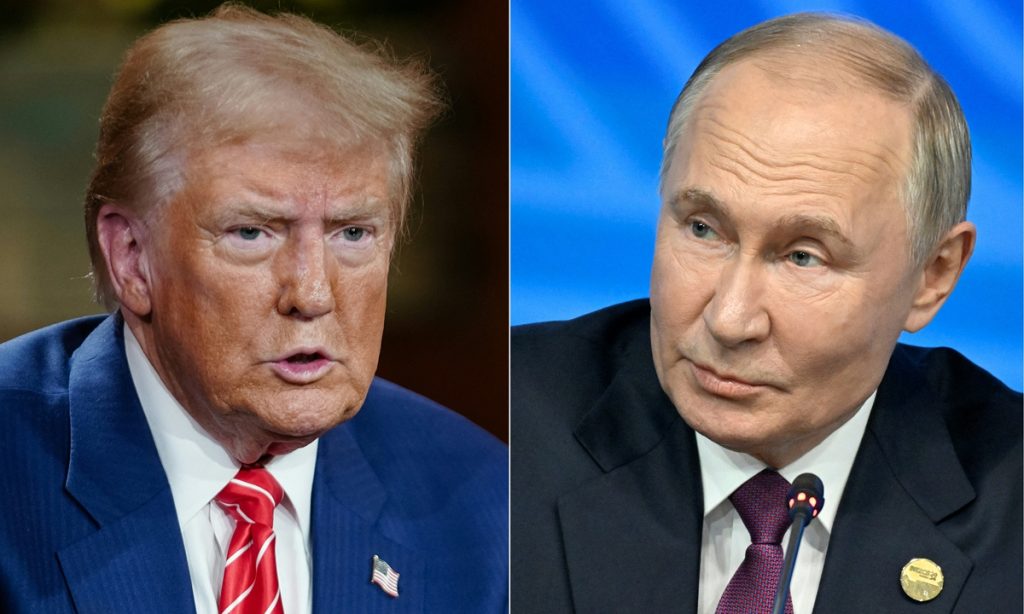Kremlin denied Putin-Trump phone call; Europe raises fresh concern over potential policy shift from US

Kremlin on Monday denied reports that President Vladimir Putin and US President-elect Donald Trump spoke over the phone last week about the Ukraine crisis, and said Putin had no concrete plans yet to speak to Trump, media reported.
The attention over Putin's interaction with Trump reflects the weight it carries on global geopolitics as the Russia-Ukraine conflict has dragged on for more than two years, with ripple effects spreading to the rest of the world.
Coming amid recent escalations at the Russia-Ukraine frontline, Europe has voiced fresh concerns about possible policy shifts on the conflict and in turn the potential impact it would bring to the continent's security.
Regarding concerns in Europe, observers said the Russia-Ukraine conflict has provided a painful lesson for some politicians who supported NATO's "eastward expansion." The experts advised Europe to strengthen its own security capabilities and strategic autonomy based on its own interests, rather than blindly following the US.
The phone call
The Washington Post reported Sunday that Trump had spoken with Putin on Thursday, advising the Russian president not to escalate the conflict with Ukraine and reminded him of Washington's "sizable military presence in Europe," citing several people familiar with the matter.
Kremlin spokesman Dmitry Peskov on Monday denied that the phone call took place, AFP reported, saying the report was "completely false information."
The phone call has drawn intense attention as the conflict has intensified over the past few days.
Ukraine attacked Moscow on Sunday with at least 34 drones, the biggest drone strike on the Russian capital since the conflict broke out in 2022, Reuters reported. The attack injured five people and forced flights to be diverted from three of Moscow's major airports.
Russian air defenses destroyed another 50 drones over other regions of Western Russia on Sunday, according to the country's defense ministry, Reuters said.
News of the call comes as Ukraine on Sunday launched a major drone attack on Moscow and five other Russian regions, injuring one person and forcing three airports to temporarily halt operations, officials in Moscow said.
Meanwhile, media reports said Ukraine is bracing to hold land it gained in Russia's Kursk region amid reports that Moscow is preparing a counteroffensive, the Washington Post reported.
The series of moves taken by Ukraine recently can be seen as an attempt by Ukraine and some in the US to stir up chaos, thereby giving the US more justification for a deeper engagement in the conflict, Lü Xiang, a research fellow at the Chinese Academy of Social Sciences, told the Global Times on Monday.
However, as Russia has not taken aggressive countermeasures, such a scheme is thwarted; meanwhile, the current government is well aware that with Ukraine requiring billions of dollars in economic and military support every month to continue to fend off Russia, a deeper involvement is something the US cannot bear, Lü said. The expert believes there is little chance the US will take significant action on the Ukraine issue before Trump officially takes office.
With little more than two months left in the White House, US President Joe Biden is running out of time to expedite the delivery of funds and weaponry needed to ensure that Ukraine can stay in the fight, said an opinion piece by The Guardian. The article said the White House is transferring weapons and up to $6 billion in remaining aid as quickly as possible to Ukraine.
"While the Biden administration is seizing the last opportunity to support Kiev in order to prevent a shift in US' stance afterwards, it has exhausted its options," Cui Heng, a scholar from the Shanghai-based China National Institute for SCO International Exchange and Judicial Cooperation, told the Global Times. What the US can offer is "very limited," Cui said.
In his presidential campaign, Trump said he would bring an "immediate end" to the conflict, though he did not offer details about how he intended to do so. However, Trump has reportedly proposed a "peace plan" that would "see the current frontline frozen in place and Ukraine agreeing to shelve its ambition to join NATO for 20 years," the Telegraph reported on November 7, citing three Trump staffers.
Europe worried
Trump's re-election has raised fresh concerns from Europe of reduced US aid for Ukraine. British Prime Minister Keir Starmer is scheduled to meet French President Emmanuel Macron on Monday to discuss ways to help Ukraine, Reuters reported, adding that Britain and France have said it is essential to keep supporting Ukraine against Russia to protect the European continent as a whole.
"The Russia-Ukraine conflict is a lesson for those in Europe who supported NATO's 'eastward expansion,' as touching on Russia's core interests has proved to be detrimental to European security," Lü said. He noted that countries like Germany, which have long built stable energy and economic partnerships with Russia, have been hurt by the conflict.
"European leaders are now caught in a difficult position as to their stances on Moscow. If the US moves to repair ties with Russia, some in Europe may likely follow suit," the expert said.
Cui further analyzed that Europe's concern stems mainly from two perspectives. "On one hand they are worried about the uncertainty of the Trump administration. Europe fears losing the counterbalance to Russia, which could pose a bigger threat to the continent's security," Cui said, "while on the other hand the fear comes from the controversial policy Trump had taken during his last term, as he pressured Europe to take on more responsibility for its own defense."
But whatever policy Trump would take for the new term, Europe needs to strengthen its own strategic autonomy based on its own interests, rather than blindly following the US, Cui noted.
To ease tensions on the Russia-Ukraine frontline, Cui suggests the West to reduce hostility toward Moscow and engage in frank dialogue with the Russian side.